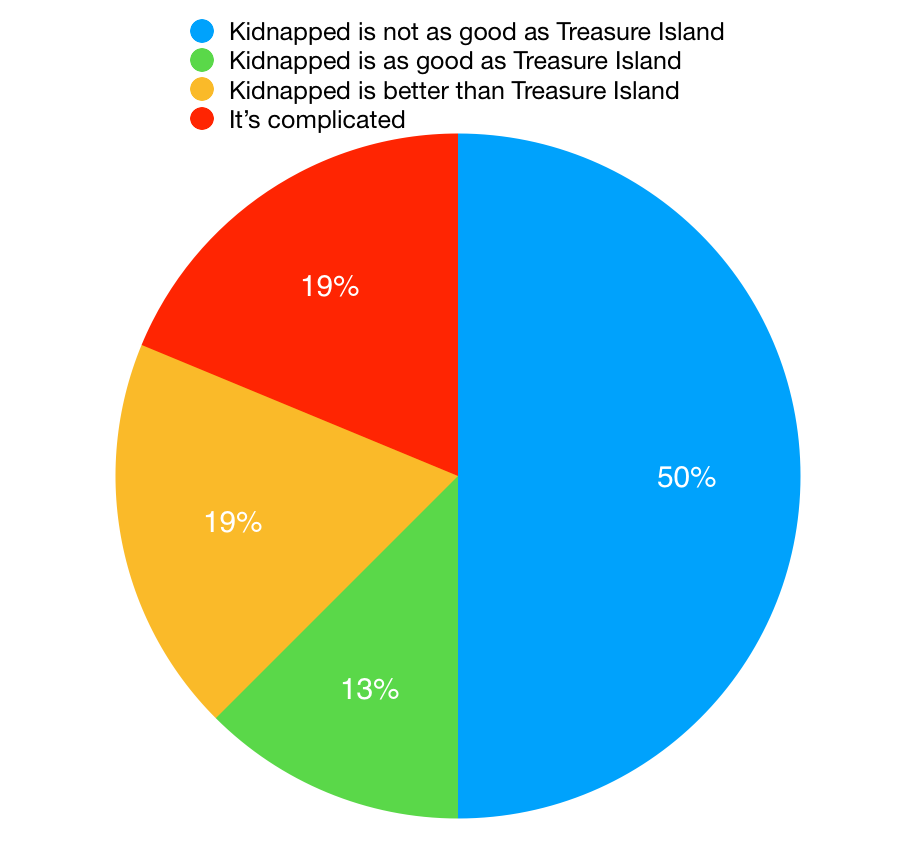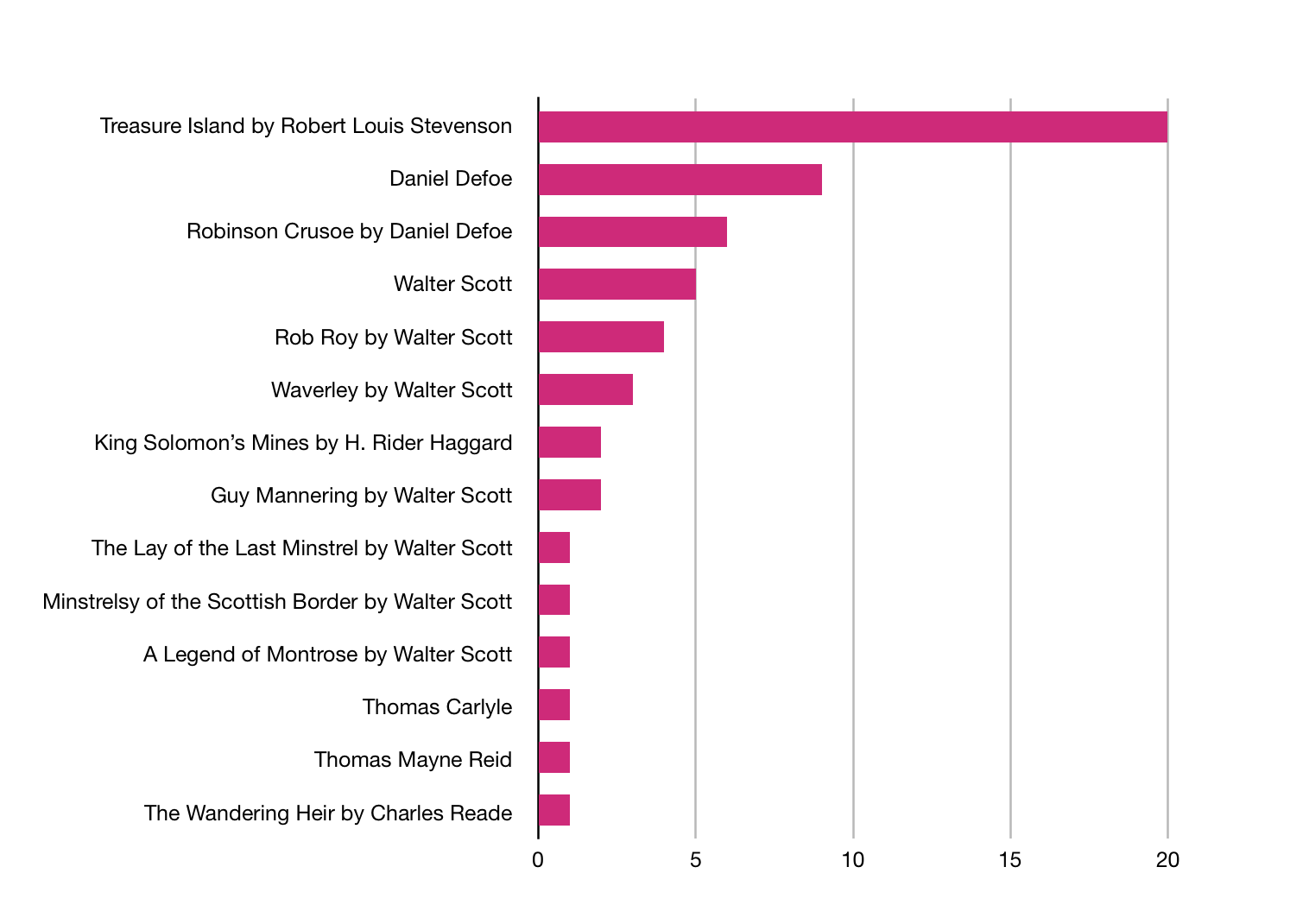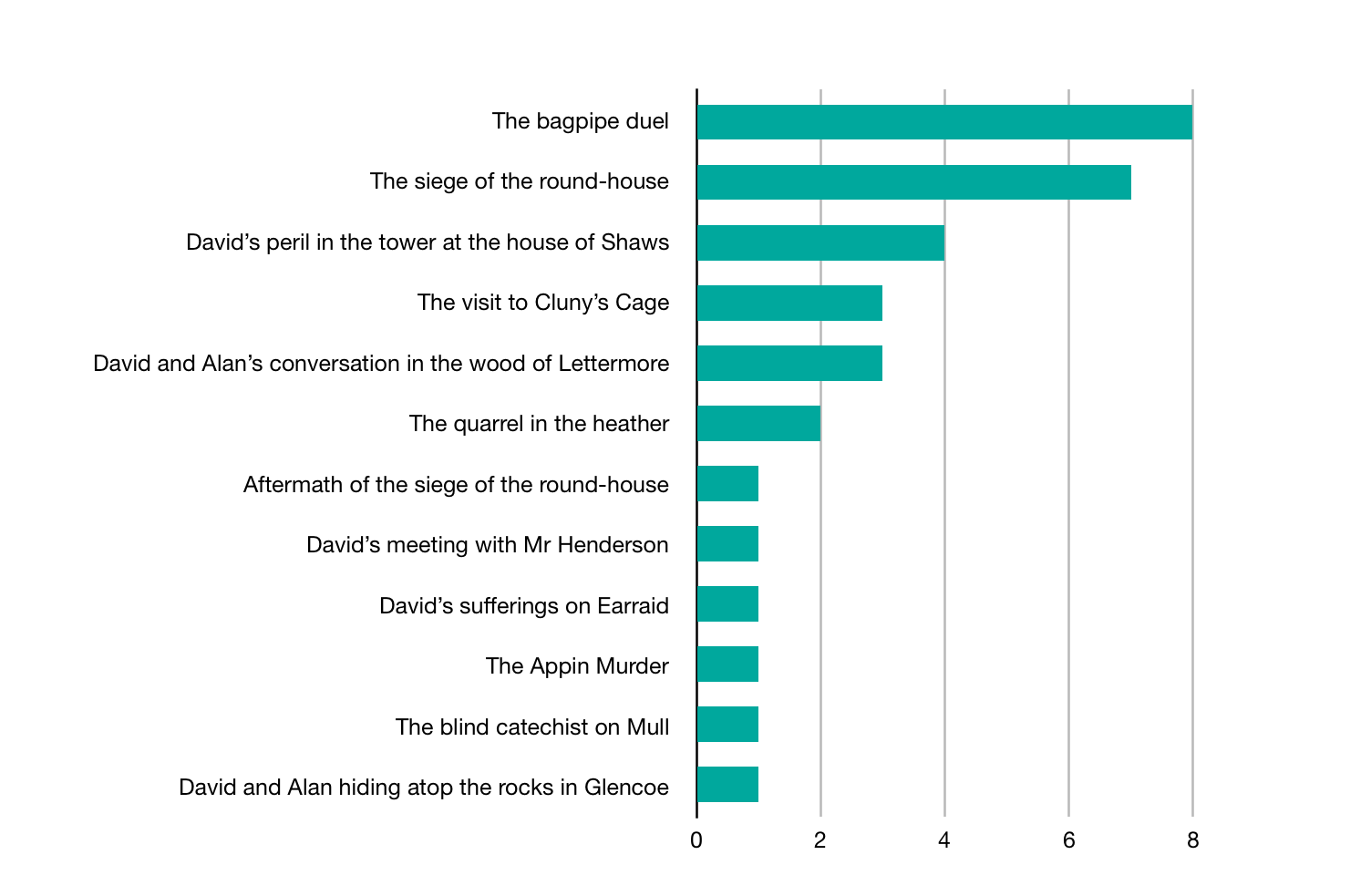At long last, the collection of contemporary reviews of Kidnapped is up at the website! I had a lot of fun researching these and putting the page together; apart from anything else, just seeing the language people in 1886 use to talk about books is really fascinating. Now, reviewers had a lot to say about this book (the sheer volume of material in comparison with The Flight of the Heron rather surprised me at first, but then RLS was a lot more famous than DKB even at the time). You may not feel like reading through the entire 27,000-odd words of reviews, in which case I have put together some highlights, summarised here with graphs!
Debate on this question raged intensely and fiercely in the reviews; here are the final results:

No opinion has an overall majority! But a plurality of reviewers think that Kidnapped is not as good as Treasure Island. I am very much looking forward to reading Treasure Island for myself so I can weigh in on this important question. 'It's complicated' opinions included this balanced judgement from Truth: ‘Though nothing like so good a boy’s book as “Treasure Island,” it is incomparably superior to it and to everything else Mr. Stevenson has yet done in the amazing imaginative force of its conceptions and of its descriptions.’
Many of the reviews compare Kidnapped to other books—either specific titles or the work of an author in general—and I've collected these here:

Between Treasure Island—an unsurprising most popular comparison—and Robsinson Crusoe, reviewers seem to prefer highlighting the 'boy's adventure story' aspect of the book more than the 'Jacobite-themed historical novel' aspect in their comparisons—though Scott's Jacobite novels also make a respectable appearance. Also interestingly, three reviewers expressed the view that Kidnapped is notably unlike The Strange Case of Dr Jekyll and Mr Hyde.
Many reviewers pick out particular scenes as their favourites—some quoting at considerable length from them—and here are their opinions summarised:

The most popular scene is the bagpipe duel between Alan and Robin Oig. The siege of the round-house is also very popular—and in fact I found it a few times excerpted in 'here's a good bit from a book' sections in newspapers that were not also reviews, and if I'd counted those too it would have come out on top. I can't say the reviewers have especially good taste in those choices; and only two of them mentioned the objective best scene in the book, the quarrel in the heather.
Nearly everyone weighed in on this question; this is only a selection!
‘...likely to live, and to be a favourite with readers of all sorts and classes.’ —The Spectator
‘Young readers will go wild over it, and the older ones are not likely to lay it down until they read it through.’ —The Atlanta Constitution
‘...every boy, young or old...’ —The School Journal
‘...will find acceptance in the hands of the old as well as the young, and be eagerly read and enjoyed wherever the English language is spoken.’ —American Magazine
‘it is a book which men, we fancy, should like quite as well as boys, and which some men might like better than some boys.’ —Lyttelton Times
‘...every reader of the World will probably become a reader of Mr. Stevenson’s book...’ —The New York World
‘...all boys (of from twelve to sixty)...’ —advertisement appearing in various publications
‘...will please all classes of readers, and here and there are touches of character that will throw Scotchmen into ecstasies.’ —The Daily Telegraph (Napier, New Zealand)
‘...a vast constituency of admirers...’ —Toronto Daily Mail
‘...he has written a charming book for boys—and as usual, when he does this, everybody reads it.’ —The Civil & Military Gazette (Lahore)
‘It is a story for boys, and it is one that men also will read with great pleasure.’ —The Scotsman
‘...thoroughly interesting to readers of all ages and both sexes...’ —Salisbury and Winchester Journal [the only review to acknowledge explicitly that women or girls might enjoy the book!]
A very important question.
‘...a story which simply tells how a manly young hero of the old type...’ —The Athenaeum
‘...the atmosphere one breathes in “Treasure Island” and “Kidnapped,” written ostensibly for boys, is bracing and manly.’ —Salisbury and Winchester Journal
‘...his art is guided always by a pure and right-minded manliness [...] the story, as we read it, could have been the fruit only of a perception of the intimate spiritual fellowship between the simple-mindedness of childhood and the manliness of manhood.’ —The Church Review
‘The characteristics of this story are manliness and an exact comprehension of the Highland character.’ —Catholic World
‘Davie’s relation is as manly as it is stirring.’ —advertisement appearing in various publications
But also: ‘...[Alan] is as tender as a woman to his companion...’ —The Morning Post
‘...as in “Treasure Island,” he has succeeded in telling a story in which women and feminine influence play positively no part. There is no love-making in “Kidnapped,” and, with one exception, no woman takes any share in the action. There are some pretty and touching passages illustrative of the unspoken love of man for man which has been a finer side of human intercourse since the days of David and Jonathan. But of the conventional heroine and the yet more conventional love scene, which are wont to appear even in so-called books for boys, Mr. Stevenson will have none.’ —St. James’s Gazette
‘To be able to make a story in which there are no love scenes, thoroughly interesting to readers of all ages and both sexes, implies a triumph of skill.’ —Salisbury and Winchester Journal
‘...without the interest of love, with scarce so much as a woman in it, indeed; appealing to us by none of the means through which the novel is wont to address us; enchaining and fascinating us by the simple force of the world-old love for an out-and-out story...’ —The Church Review
‘Kidnapped is a novel without a love-story running through it, and it is the more to be commended for that.’ —Catholic World
‘Here is a story without a particle of love or sentiment in it, but it warms the heart, stirs the pulses, and invigorates even a wearied reader.’ —Life
‘There is hardly a woman in the book, and there is no hint of a courtship or a marriage, but for all that it is one of the most thrilling stories in print.’ —The Atlanta Constitution
Is Kidnapped better than Treasure Island?
Debate on this question raged intensely and fiercely in the reviews; here are the final results:

No opinion has an overall majority! But a plurality of reviewers think that Kidnapped is not as good as Treasure Island. I am very much looking forward to reading Treasure Island for myself so I can weigh in on this important question. 'It's complicated' opinions included this balanced judgement from Truth: ‘Though nothing like so good a boy’s book as “Treasure Island,” it is incomparably superior to it and to everything else Mr. Stevenson has yet done in the amazing imaginative force of its conceptions and of its descriptions.’
What other books is Kidnapped like?
Many of the reviews compare Kidnapped to other books—either specific titles or the work of an author in general—and I've collected these here:

Between Treasure Island—an unsurprising most popular comparison—and Robsinson Crusoe, reviewers seem to prefer highlighting the 'boy's adventure story' aspect of the book more than the 'Jacobite-themed historical novel' aspect in their comparisons—though Scott's Jacobite novels also make a respectable appearance. Also interestingly, three reviewers expressed the view that Kidnapped is notably unlike The Strange Case of Dr Jekyll and Mr Hyde.
What are the best bits of it?
Many reviewers pick out particular scenes as their favourites—some quoting at considerable length from them—and here are their opinions summarised:

The most popular scene is the bagpipe duel between Alan and Robin Oig. The siege of the round-house is also very popular—and in fact I found it a few times excerpted in 'here's a good bit from a book' sections in newspapers that were not also reviews, and if I'd counted those too it would have come out on top. I can't say the reviewers have especially good taste in those choices; and only two of them mentioned the objective best scene in the book, the quarrel in the heather.
Who will read it?
Nearly everyone weighed in on this question; this is only a selection!
‘...likely to live, and to be a favourite with readers of all sorts and classes.’ —The Spectator
‘Young readers will go wild over it, and the older ones are not likely to lay it down until they read it through.’ —The Atlanta Constitution
‘...every boy, young or old...’ —The School Journal
‘...will find acceptance in the hands of the old as well as the young, and be eagerly read and enjoyed wherever the English language is spoken.’ —American Magazine
‘it is a book which men, we fancy, should like quite as well as boys, and which some men might like better than some boys.’ —Lyttelton Times
‘...every reader of the World will probably become a reader of Mr. Stevenson’s book...’ —The New York World
‘...all boys (of from twelve to sixty)...’ —advertisement appearing in various publications
‘...will please all classes of readers, and here and there are touches of character that will throw Scotchmen into ecstasies.’ —The Daily Telegraph (Napier, New Zealand)
‘...a vast constituency of admirers...’ —Toronto Daily Mail
‘...he has written a charming book for boys—and as usual, when he does this, everybody reads it.’ —The Civil & Military Gazette (Lahore)
‘It is a story for boys, and it is one that men also will read with great pleasure.’ —The Scotsman
‘...thoroughly interesting to readers of all ages and both sexes...’ —Salisbury and Winchester Journal [the only review to acknowledge explicitly that women or girls might enjoy the book!]
How manly is it?
A very important question.
‘...a story which simply tells how a manly young hero of the old type...’ —The Athenaeum
‘...the atmosphere one breathes in “Treasure Island” and “Kidnapped,” written ostensibly for boys, is bracing and manly.’ —Salisbury and Winchester Journal
‘...his art is guided always by a pure and right-minded manliness [...] the story, as we read it, could have been the fruit only of a perception of the intimate spiritual fellowship between the simple-mindedness of childhood and the manliness of manhood.’ —The Church Review
‘The characteristics of this story are manliness and an exact comprehension of the Highland character.’ —Catholic World
‘Davie’s relation is as manly as it is stirring.’ —advertisement appearing in various publications
But also: ‘...[Alan] is as tender as a woman to his companion...’ —The Morning Post
There's no het in it; how weird is that??
‘...as in “Treasure Island,” he has succeeded in telling a story in which women and feminine influence play positively no part. There is no love-making in “Kidnapped,” and, with one exception, no woman takes any share in the action. There are some pretty and touching passages illustrative of the unspoken love of man for man which has been a finer side of human intercourse since the days of David and Jonathan. But of the conventional heroine and the yet more conventional love scene, which are wont to appear even in so-called books for boys, Mr. Stevenson will have none.’ —St. James’s Gazette
‘To be able to make a story in which there are no love scenes, thoroughly interesting to readers of all ages and both sexes, implies a triumph of skill.’ —Salisbury and Winchester Journal
‘...without the interest of love, with scarce so much as a woman in it, indeed; appealing to us by none of the means through which the novel is wont to address us; enchaining and fascinating us by the simple force of the world-old love for an out-and-out story...’ —The Church Review
‘Kidnapped is a novel without a love-story running through it, and it is the more to be commended for that.’ —Catholic World
‘Here is a story without a particle of love or sentiment in it, but it warms the heart, stirs the pulses, and invigorates even a wearied reader.’ —Life
‘There is hardly a woman in the book, and there is no hint of a courtship or a marriage, but for all that it is one of the most thrilling stories in print.’ —The Atlanta Constitution